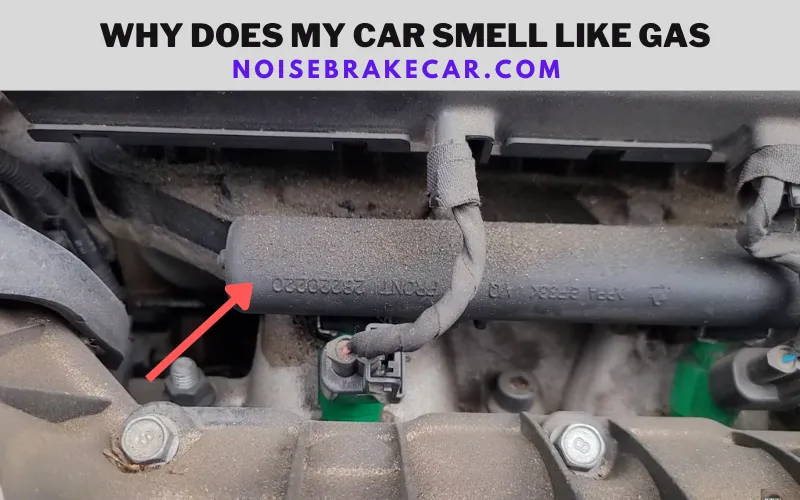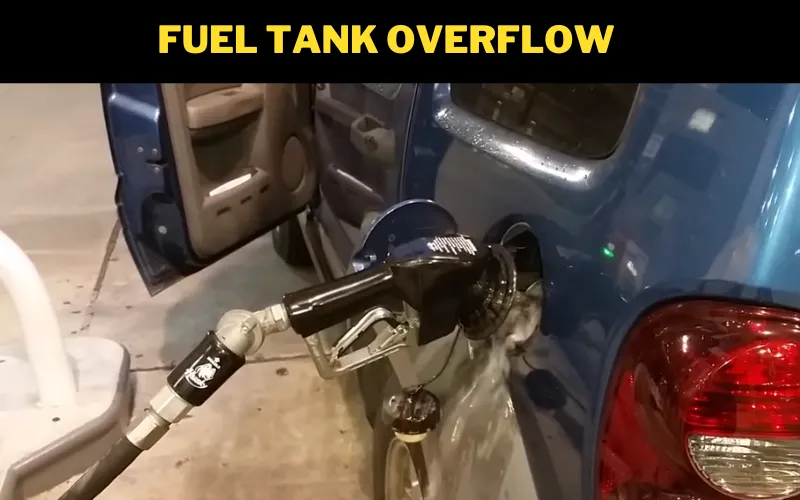We all know the smell of gasoline, but the smell it coming from your engine, that could be a problem. To maintain the safety and performance of your vehicle, it is important to understand the cause of this smell. In this article described most important reasons about smell of gasoline.
Getting to Know you Fuel System
To understand why your car’s interior may smell like gasoline, it’s important to have a basic understanding of your fuel system. Let’s look at how far fuel has come in a modern gasoline vehicle.
1) Fuel filter
After the fuel pump draws fuel from the thank, it passes through the fuel filter, which helps remove dirt, debris and other contaminates.

2) Fuel Lines and Hoses
Clean fuel now flows from the rear of the vehicle to the front trough a series of corrosion-resistant metal lines and rubber hoses.
3) Fuel Pump
When you the start the engine and turn the key to the (On) Position, then the fuel pump turns on. Typically, in the modern vehicles the fuel pump is an electric pump, located inside the fuel tank. It begins to suck fuel from the tank and increases pressure throughout the rest of the fuel system.
4) Fuel Tank
Your fuel journey starts here. The fuel tank, usually located at the rear of the vehicle, simply holds the fuel and stores it for later use.
5) Injectors
In modern vehicles, each engine cylinder is equipped with an injector that delivers the ideal amount of fuel to the cylinder. From there, the fuel mixes with the air in the combustion chamber and is compressed before ignition.
6) Injection Rail
Once gasoline reaches the engine, it is distributed to the injectors through metal pipes called fuel rails.
Most Popular Reasons Why Your Car smell like Gas
There can be many reasons why your car smells like gasoline. Let’s Look at 10 possible causes of smell and how to fix.
1) Tank Cap
If you notice that your car smells like gasoline after driving, your definitely need to check the gas cap. After opening the thank, carefully the inspect the tank cap and make sure it is never lost or loose.
If your car smells like gasoline when you start it, you should make sure your gas cap is still in good condition. In new vehicles, a damaged and loose gas cap can release gas fumes and cause the check engine light to illuminate.
Thanks to the amazing technology behind the check engine light, your car can now detect leaks using a self-test. We will show you how to fix this problem and the solution.
The first step is to check whether the fuel cap is attached or not. Many drivers after refueling forget to put it. In other case, the gas station attendant forgot to put it back Make sure you turn it clockwise to check whether it is tight or not.
And if it is stuck, remove it and inspect it carefully. If the 0-ring is missing, damaged, flat or cracked, the gas cap should be replaced.
2) Evaporative emission system problem
Modern vehicles are equipped with an evaporative emission system that prevents fuel vapors from entering the atmosphere. If a leak or malfunction occurs in this system, there may be a strong smell of gasoline. The problem could be a faulty gas cap, faulty tank vent value, or other components related to the evaporative emissions system.
3) Fuel Tank Overflow
If you frequently fill your car’s fuel tank beyond the recommended capacity, you may notice the smell of gasoline. Excess fuel can enter the evaporation system or carbon trap and cause an unpleasant odor.

4) Fuel System Problems
Some of the most common fuel system problems include clogged fuel filter, fuel pump problems and fuel injector problems. Clogged fuel filters can cause a loss of engine performance and can be resolved by replacing the filter.
Fuel pump problems such as, other problems such as a pump failure or malfunction, can cause the engine to stall or misfire and require fuel pump replacement.
Fuel injector problems such a clog or leak, can result in poor fuel economy and rough idling. This can often be remedied by cleaning or replacing the injectors.
5) The Engine does not Start
Engine misfire occur when the mixture in the combustion chamber does not ignite properly. These can cause unburned fuel to leak from the exhaust system and produce a strong smell of gasoline due to many factors including damaged spark plugs, problems with the ignition system or fuel injectors, can cause your engine to misfire.
6) The Spark Plugs May be Loose
The spark plugs produce a spark that ignites the air-fuel mixture and starts the vehicle. If The spark plugs are not installed correctly, fumes from the combustion chamber will enter the engine compartment next to the ventilation system.
Solution:
Spark plug adjustment may be required. If there is oil on the spark plug, be sure to have the oil leak required by a mechanic before replacing the plug.
7) Fuel Pressure Regulator Problems
A faulty fuel pressure regulator causes the fuel mixture to be too thick or too thin.
When the engine burns too much gasoline, the catalytic converter overheats. This increases the amount of exhaust gases emerging from the exhaust system. These vapors then enter the ventilation system.
Additionally, a damaged fuel presser regulator can cause engine misfires, reduced fuel consumption and poor engine performance.
Solution:
Have the fuel pressure regulator replaced by a professional mechanic.
8) A Faulty oil Cap Gasket or 0-Ring
Check the area around the oil filler cap. If you notice oil and dirt stains on the valuable cover, the sealing ring may be old or leaking. In this case the smell of gasoline comes from fumes from the heating ventilation and air conditioning “HVAC” system entering the vehicle interior. You may also smell gas if the 0-ring is damaged or broken.
Solution:
Check the oil cap rubber seal for cracks or contamination. To remove contaminants, clean the oil filter cap before replacing it.
However, in the event of a detect, you will need a new oil filter cover. A damaged oil seal easy to replace, but it’s best to leave your vehicle repaired to a professional.
9) Exhaust Fumes Enter your Car
Exhaust gases are produced when gas is burned when the vehicle accelerates. These vapors must be removed from the vehicle via the exhaust the pip.
Typically, a catalytic converter cleans exhaust gases and they odors they produce. So, if you smell gas, it could indicate a leak in the exhaust system. A leaky exhaust system will make a loader noise than usual or a knocking noise when the car accelerates.
The louder the ticking noise, the closer the exhaust leak is to the engine.
10) Your Charcoal Container is Damaged
The EVAP system captures gasoline vapors in an activated carbon canister. A damaged carbon insert can cause fuel vapors to enter the interior of the vehicle. The defective carbon tank may be broken or have a short in the value circuit.
Solution:
If you notice a strong odor, hear a rattling noise, and notice reduced performance, this may indicate a damaged charcoal canister. For replaced the charcoal, take your car to a professional mechanic.
11) You Have an Old Car
Before the mid-1980s, technology used in carburetor or float bowl of vehicles manufactured may cause a gasoline smell when starting and stopping the vehicle.
Additionally, used vehicles may not have as efficient an integrated evaporative emissions system as new vehicles. This means that gasoline vapors easily penetrate into the interior of the car
12) Gas Leak Outside
Last but not least, gas leak outside. This means you recently refueled your car. The good news is that there where no gas leaks anywhere.
When was filled up your car last time? If this happened recently, roll down the windows and drive normally, if the smell persists, it is not an external gas leak.
Is it Safe to Continue Driving if I Smell Gasoline?
If you driving, you must stop and turn immediately disabled engine. There may be a problem that makes driving dangerous. Some gas smell problems in your car can cause vehicle fires and other problems. It is necessary to investigate and determine the cause of the smell of gas.
In most cases the answer is no, If the problems are simple, your car will neither catch fire nor explode. However, it is impossible to determine the severity of the problem until it is incompletely resolved.
Not to mention that the gas fumes are poisonous. Inhaling it poisons you and others. Therefore, you need to check for leaks as soon as possible.
Car Smell Like Gas When I Started it but goes Away
If you only smell gasoline when you first start your car, you are probably dealing with a gas leak somewhere in or near the vehicle. This can from the engine itself, the fuel line and the exhaust system where the gases evaporate.
Does it Smell like Gas in the Car? There Could be a fuel leak
Fuel system leaks are a common (and extremely dangerous) causes of gasoline smells in moving vehicles.
However, wear and tear are not always the cause of the fuel leaks on the. Modern vehicles use a fuel pressure regulator to maintain optimal pressure in the fuel system. If this regulator fails, it can affect your pressure.
Fuel leaks should never be ignored as they pose a major safety risk. Fuel splashes onto the engine or exhaust system can ignite and cause a dangerous vehicle fire. Fuel vapors accumulated in the garage can also be extremely volatile.
If you smell gasoline while driving, it is important to get your vehicle repaired as soon as possible.